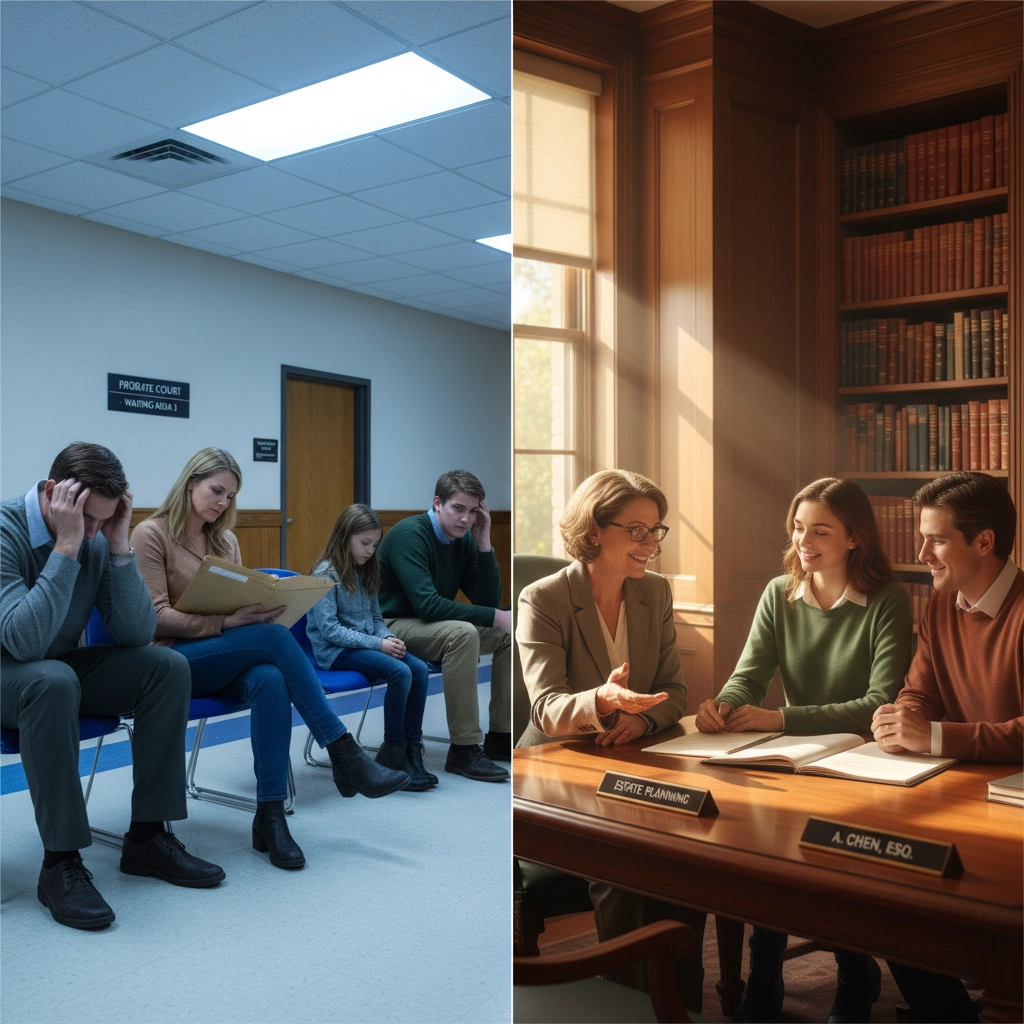If you’re a California parent wondering whether your family needs a trust vs will, you’re asking one of the most important questions for your family’s future. The answer isn’t one-size-fits-all, and honestly, that’s probably why you’re feeling a bit overwhelmed by all the conflicting advice out there.
Here’s the truth: most California families actually benefit from both a trust and a will working together. But let me walk you through exactly what each one does, when you need which (or both), and how to make the right choice for your unique family situation.
What Exactly Is a Will?
Think of a will as your final letter to your family and the court system. It’s a legal document that tells everyone what you want to happen to your stuff and, most importantly, who should take care of your children if something happens to both you and your spouse.
A will is a legal document that can name guardians for your minor children. That alone makes it essential for any parent. But here’s what most people don’t realize: in California, your will has to go through probate court, which means:
- Your family’s private business becomes public record
- The process typically takes 18-24 months (sometimes longer)
- Court fees are calculated on the gross value of your assets, not what you actually own after debts
- Your family can’t access most assets during this lengthy process
If you own a home in California worth $800,000 but you owe $600,000 on the mortgage, probate fees are calculated on the full $800,000. That could mean $20,000+ in legal fees alone, even though your actual equity is only $200,000.

What Exactly Is a Trust?
A trust is like creating a protective container for your assets while you’re alive. You put your house, bank accounts, and investments into this container (called “funding the trust”), and you control everything as the trustee. Nothing changes in your day-to-day life – you still live in your house, spend your money, and make all the decisions.
The magic happens if you become incapacitated or when you pass away. Your successor trustee (someone you choose) can immediately step in and manage everything according to your instructions. No court involvement, no public records, no waiting periods.
But here’s what a trust cannot do: it can’t name guardians for your children. That’s why most families need both documents.
The Key Differences That Matter for Your Family
Speed and Privacy: When you pass away, assets in a trust transfer to your beneficiaries within weeks. Assets that go through probate (via a will) take over a year and become part of public records that anyone can access online.
Cost Over Time: Yes, a trust costs more upfront – typically $3,750-$6,000 for a comprehensive plan. But probate can cost your family $15,000-$30,000+ for a typical California home, plus the emotional toll of waiting and uncertainty.
Control and Flexibility: A will basically says “give everything to my spouse, or if they’re gone, split it among my kids.” A trust lets you say things like “my daughter gets her inheritance at age 25, but only for education and home purchases until then” or “if my son struggles with addiction, the trustee should use their discretion about distributions.”
What’s Different About California in 2025?
California has some unique rules that make this decision even more important for families here:
Probate Fees: California is one of the few states where probate fees are set by statute based on the gross value of assets. With median home prices still over $800,000 in most areas, even modest families face substantial probate costs.
Real Estate Appreciation: If you bought a home years ago, it may have appreciated significantly. Your family could face probate fees on the current value, not what you paid.
Community Property Laws: California’s community property laws can create complications during probate, especially for blended families.

Scenarios: What Makes Sense for Different Families?
Young Families (Kids Under 18, Modest Assets)
Sarah and Mike, ages 32 and 34, two kids, $150,000 home equity, $50,000 in savings
You might think: “We’ll just do a simple will.” But even for young families, a trust often makes sense because:
- You avoid probate on your home (saving thousands in fees)
- If both parents die, your children’s inheritance is managed by a trustee instead of court-supervised guardianship of the estate
- You can set guidelines for how money should be used for your children’s care
Best choice: Trust for assets, will for guardianship, both working together.
Blended Families
Jennifer and Tom, second marriage, kids from previous relationships, $600,000 home
This is where trusts really shine. You can ensure:
- Your biological children receive their intended inheritance
- Your current spouse is taken care of during their lifetime
- No family conflicts over who gets what
- Everything happens privately, without court drama
Best choice: Definitely a trust-based plan with very specific instructions.
Older Adults (Empty Nesters)
Robert and Linda, ages 58 and 62, adult children, $1.2 million in assets
At this stage, you want:
- Complete probate avoidance to preserve wealth
- Privacy for your family
- Flexibility to handle incapacity planning
- Potential tax benefits
Best choice: Comprehensive trust plan, potentially with tax planning strategies.
California Homeowners (Any Age)
Anyone who owns real estate in California
Here’s the simple truth: if you own real estate in California, you need a trust. The probate costs alone make this a no-brainer. A $500,000 home means about $15,000 in probate fees. A $1 million home? Over $25,000 in fees, plus attorney costs.

The “Both Documents” Strategy That Most Families Choose
Here’s what I recommend for most California families: a revocable living trust to hold your major assets, paired with a “pour-over will” that catches anything you might have missed and names guardians for your children.
This gives you:
- Probate avoidance for your major assets
- Privacy and control through the trust
- Guardian nominations through the will
- Incapacity planning built in
- Flexibility to add conditions for your children’s inheritances
Think of it like wearing both a seatbelt and having airbags in your car. Each serves a different purpose, but together they provide complete protection.
Making the Decision: Questions to Ask Yourself
- Do you own real estate in California? If yes, you need a trust.
- Do you have minor children? If yes, you need a will (for guardians) and a trust for asset management.
- Is privacy important to you? Probate makes your family’s financial business public record forever.
- Do you want control over how and when your children receive their inheritance? A trust gives you this flexibility; a will doesn’t.
- Are you in a blended family? A trust provides much clearer directions and avoids potential conflicts.

Your Next Step: Don’t Leave This to Chance
I’ve seen too many families struggle through probate, waiting over a year to access their own inheritance, paying tens of thousands in unnecessary fees, all while their private family matters become public record. I’ve also seen families torn apart by confusion about what mom and dad actually wanted.
But I’ve also had the privilege of working with families who planned ahead. Their loved ones receive clear instructions, immediate access to resources, and the peace of mind that comes from knowing exactly what to do during an already difficult time.
Your family deserves that same peace of mind.
The choice between a trust and a will isn’t really about the legal documents – it’s about the legacy you want to leave and the experience you want your family to have when they need your plan most.
As your Personal Legacy Lawyer®, I don’t believe in one-size-fits-all solutions. Every family is different, and your plan should reflect your unique values, concerns, and dreams for your children’s future. That’s why I start every relationship with a comprehensive Life & Legacy Planning Session, where we’ll explore what matters most to you and design a plan that fits your family perfectly.
Ready to give your family the clarity and protection they deserve? Let’s have a conversation about what’s best for your unique situation. You can schedule a complimentary 15-minute discovery call with me at personallegacylawyer.com or call 855-965-3666.
Your family’s future is worth 15 minutes of your time today.




